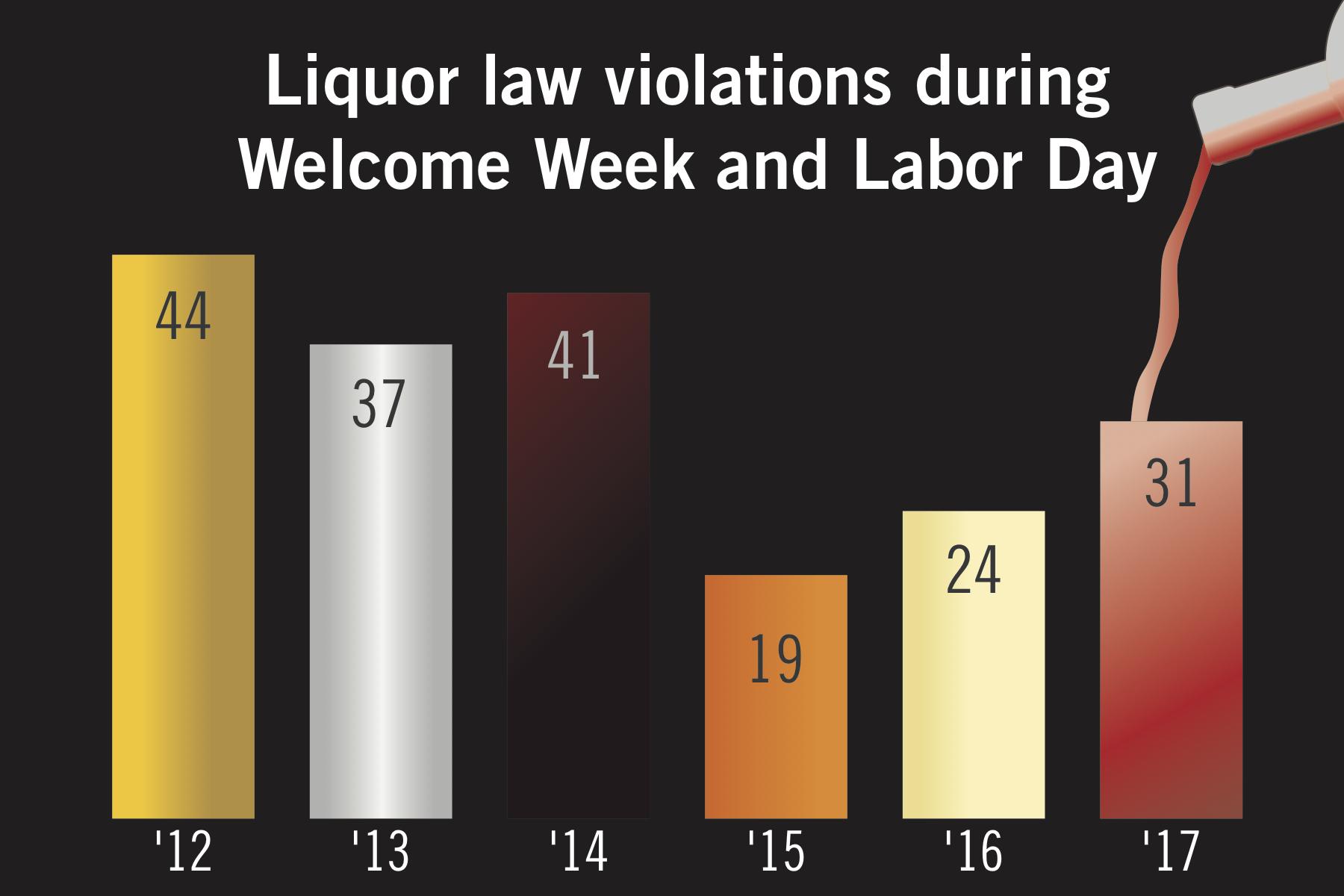
Yonah Bromberg Gaber | Graphics Eidtor
Source: GW Crime Log
The number of reported alcohol violations rose during Welcome Week and Labor Day weekend for the third year in a row.
Liquor law violations between move-in day on Saturday and Labor Day Monday increased from 19 in 2015, up to 24 last year and then 31 this year, according to the GW crime log. The increase of more than 63 percent fell during the two year stretch when alcohol violations are the most common crime as students return to campus after the summer, University spokeswoman Maralee Csellar said.
Experts in campus security and alcohol violations said a requirement for more students to live in University housing could spawn more violations in residence halls. Starting last academic year, partly out of an effort to reduce off-campus noise, the University began mandating that juniors live on campus.
Csellar said the University Police Department has not changed how it enforces liquor law violations and that the amount of officers patrolling would not affect the number of alcohol-related incidents.
“Patrol officers do not seek out violations, they respond to tips and reports from other campus community members,” she said in an email. “Officers respond to the scene and conduct an investigation to determine if there is a violation.”
Csellar added that the number of crimes reported in September is higher compared to other times of the year.
The increase over the last two years followed a nearly 54 percent decrease in alcohol violations between 2014 and 2015 when reports dropped from 41 to 19 during the first week, according to the crime log.
Besides possessing and drinking alcohol underage, liquor law violations are also given to students over 21 years old who provide alcohol to underage drinkers, according to GW’s alcohol policy.
Gail D’Onofrio, the physician-in-chief of the Yale-New Haven Hospital Emergency Department, said the more upperclassmen are living in on-campus housing, the more students will have alcohol in their rooms, which she said was a more likely explanation for the increase than students simply drinking alcohol more frequently.
District House opened last fall as the second largest residence hall on campus.
D’Onofrio also said an increase in enforcement or a change in policies could have sparked the climb.
“I doubt drinking is going up,” she said. “It’s pretty up across campuses all over the place, so I suspect at your institution they have just either created new guidelines and are enforcing them, or they’re reinforcing old guidelines.”
Although the number of violations reported to UPD rose, some residents of the surrounding neighborhood said they have less complaints about noise and partying from students’ off-campus homes so far this year.
Peter Maye, who lives next door to students on 26th Street, said the University has become more responsive when dealing with off-campus disturbances compared to years prior. In 2014, officials formalized punishments for off-campus student violations.
“Last year, specifically, they really sort of became good partners,” he said. “The University actually asked us to notify them and the police if we were making any calls and so the University really improved 1,000 percent in helping everybody sort of live together.”
In the past, neighbors have clashed with off-campus students over noise and trash violations. Almost every weekend last academic year, Maye contacted the University for noise complaints, he said.
Beginning in 2013, the University created a mandatory “Be a Good Neighbor Policy” online orientation for undergraduate students living both on and off campus. The module provides students with noise and disorderly conduct regulations and other neighborhood information.
Then two years later, the University started offering a hotline for neighbors to report any off-campus disturbances through a community response program.
Csellar, the University spokeswoman, said officials received three complaints from an off-campus residence in Georgetown housing students during the first week of the semester. The complaints were referred to the Office of Student Rights and Responsibilities, she said.
“At the beginning of every new school year we tend to receive a handful of comments or inquiries about students living off-campus,” she said.
She declined to say if the University changed any policies regarding off-campus students or the community hotline so far this year.
Not all neighbors said the University’s regulation of noise is improving.
Donald Kreuzer, who has been living on the corner of 23rd Street and Virginia Avenue for 44 years, said student noise has not gotten any better since the University bought the property surrounding his home, transforming the buildings into fraternity and sorority houses on Townhouse Row, during former University President Stephen Joel Trachtenberg’s tenure.
“You just have to spend two evenings with me, a Thursday and Friday, and you can experience for yourself what we have to live with,” Kreuzer said in an email.




